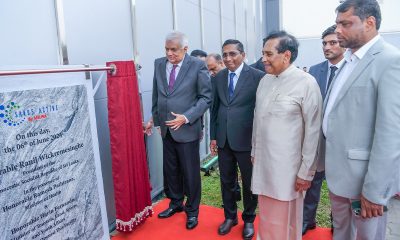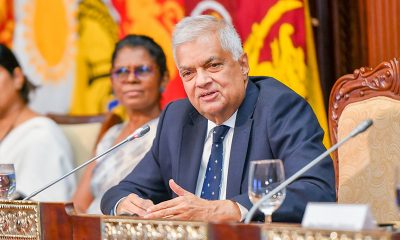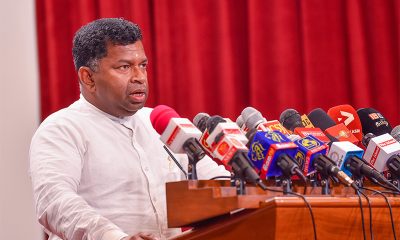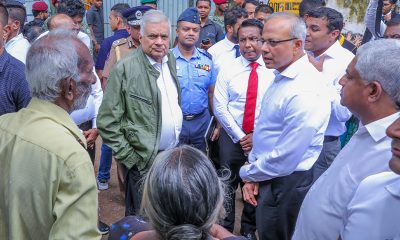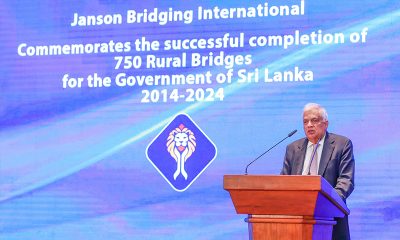Latest News
Non-aligned nations, once perceived as weak states, have evolved beyond that characterization -President
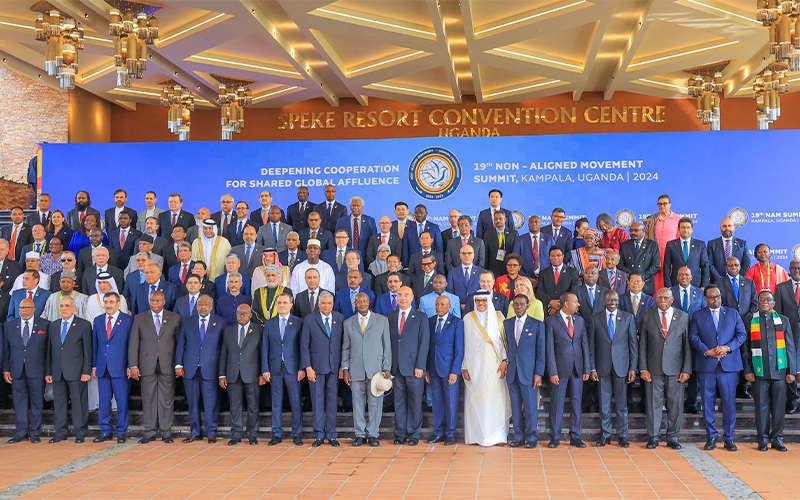
President Ranil Wickremesinghe addressing the 19th Non-Aligned Movement (NAM) Summit in Kampala, Uganda said that Non-aligned nations, once perceived as weak states, have evolved beyond that characterization.
He also expressed gratitude to President Museveni and Uganda for hosting the summit.
Following is the full speech delivered by President Ranil Wickremesinghe;
“Let me begin by congratulating you President Yoweri Museveni of Uganda for taking over the helm of the Non Aligned Movement at this 19th Summit. Your leadership is even more timely as Uganda assumes this role at a critical moment of collective awareness among countries of the global South. This is the first NAM Summit following the onset of the pandemic, the debt crisis, climate catastrophe, new global competition, and the ensuing multiple implications for the world, in particular, for the Global South.
As we meet today, a humanitarian crisis is unfolding in the Gaza Strip and beyond. For over 3 months immense suffering and losses have been endured by the Palestinian civilian population, endangering regional security and stability. Until now, the NAM was largely silent. How can we remain silent when the Gaza is destroyed? People denied humanitarian aid and a vast majority of the dead are innocent civilians. Silence implies consent. It is encouraging that this 19th Summit has given the highest priority to this crisis in Gaza and the inalienable rights of the people of Palestine to self- determination and the realisation of an independent and sovereign state of Palestine. We must congratulate South Africa for the bold stand it has taken in regard to Gaza. The international community has already called for an immediate humanitarian ceasefire and a release of hostages.
There cannot be a two state solution based on one state – Israel. No resolution is possible without a state of Palestine. Therefore, in line with multiple UN Resolutions, and the Declaration of this Summit, the international community must recognise the West Bank, Gaza and East Jerusalem as territories coming within the State of Palestine and in addition there should be no change in the ethnic composition of Gaza. Sri Lanka also proposes that the State of Palestine be established within 5 years and no more.
We are now witnessing the end of the post cold war order and the coming into being of the evolving multipolar world. On the geopolitical front, we are witnessing a resurgence of latent and open conflicts involving former and aspiring major powers. In Europe the transatlantic military alliance has been strengthened, past arms control agreements have collapsed, military expenditure has reached historically unprecedented levels and nuclear weapons are once again the subject of apparently serious policy discussion. Outer space and the oceans have become potential theatres of conflict and geo-strategic competition including in our vicinity in the Indian and Pacific Oceans.
Free trade and economic integration is being reversed by policy driven rise of trade protectionism due to strategic competition among major powers. Furthermore, this being extended further with the concepts of de-coupling and de-risking. A unilateral declaration of a new trade order and the setting aside of multilateralism by the West of the WTO. The weaponising of the Dollar. New challenges of economic and the debt crisis, climate justice, food and energy security. Digital and technological divides and advanced WMD arsenals have aggravated existing inequalities between the developing states of the NAM and the developed world.
The theme of this Summit ‘Deepening Cooperation for Shared Global Affluence” reflects the need to address the inequities between our two worlds. Furthermore, experience shows us that, to succeed we need a strong and a united NAM that contributes to a better world for all. To do so, we have to reinvent ourselves.
Our membership today is no longer a grouping of weak states. We must recognise that as a result of the rapid progress and economic advancement of some of Asian, African and Latin American states. A majority of the 10 leading economies of 2050 will belong to this movement. We see among us, rising aspirants for leadership status in global affairs. They must be prepared to give leadership. Furthermore, there is a vital role we must play as geostrategic rivalries in political, economic, technological and military terms becomes more pronounced among former and new contenders for Major Power status.
Therefore, the NAM must reinvent itself under your Chairmanship. Assume a new role in a multipolar world – to transform itself as the largest bloc representing the Global South. We must also recast our objectives. While upholding the Bandung Principles in the evolving multipolar world we need to,
- oppose the spread of big power rivalry including the coercion of uncommitted states,
- build a multipolar world which incorporates the political, economic, social and climate change mitigation aspirations of the Global South.
Let us transform ourselves from this loose movement to become a dynamic bloc of the Global South and its friends. Let us establish an effective permanent operational structure which is equipped to address the contemporary challenges facing the Global South. An organisation which is capable of shaping the new order.
Our future lies in our hands.
We can make it or break it. Let us make it work.
Let me conclude by thanking you Mr President and the Government of Uganda for the excellent arrangements for hosting this important 19th Summit of the Non Aligned Movement.”
(PMD)
Latest News
‘Bloody policies’: MSF recovers 11 bodies from Mediterranean off Libya
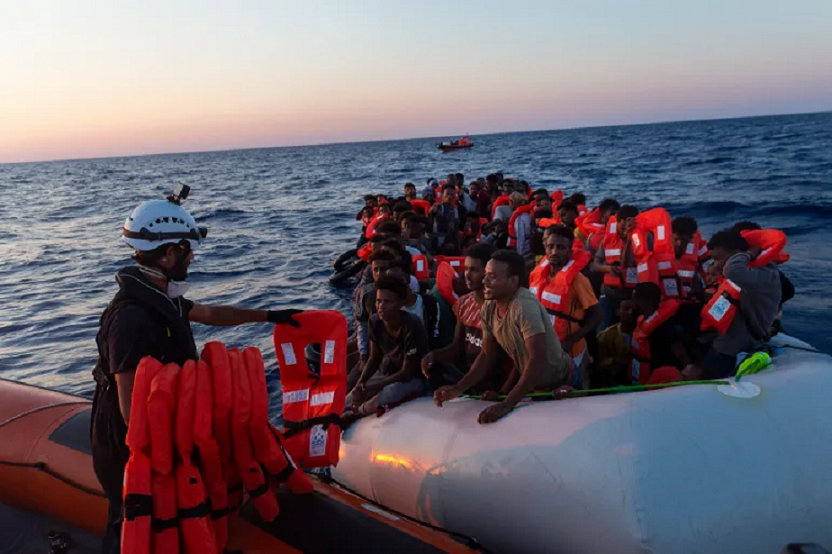
The aid group Doctors Without Borders has reported recovering 11 bodies and rescuing dozens of people off the coast of Libya as it criticised the migration policies of the North African country and European countries.
In a statement on Friday, the group, known by its French initials MSF, said its Geo Barents rescue vessel managed to recover the bodies following a search operation lasting more than nine hours after being alerted by German nongovernmental organisation Sea-Watch, which also rescues refugees and migrants.
“As we cannot determine the reason behind this tragedy, we know that people will continue to take dangerous routes in a desperate attempt to reach safety, and Europe must find safe and legal pathways for them,” MSF said in a post on X. “This catastrophe must end!”
Sea-Watch said it is unclear whether the bodies were victims of a previously unknown shipwreck, adding that they tried to contact Libya’s coastguard to go and retrieve the dead, but received no reply.
“The so-called Libyan coastguard – financed by the EU – ignored our call demanding that the bodies be recovered,” the group said.
Thousands of people trying to head from Africa to Europe use Libya as a departing point, with the Italian island of Lampedusa the nearest European destination as they undertake the dangerous journey across the Mediterranean to escape war, poverty and persecution.
Italy, which wants to put a stop to the migration stream, has said Libya and neighbouring Tunisia must do more to stop people from going to sea. It has also clamped down on the operation of the rescue ships, arguing that they encourage people to head to Europe, a charge that is denied by the charities.
Emphasising its policy on the rescue ships, Italy said on Friday that it forced the MSF rescue vessel to take the 165 people that it had saved from boats in the Mediterranean operation to the northern port of Genoa. The port was more than 650 nautical miles (1,200km) from their position and much farther than the more convenient ports in nearby Sicily, significantly delaying assistance to the rescued.
The route in the central Mediterranean is the most dangerous migrant crossing in the world, with the United Nations registering more than 20,000 deaths and disappearances in the area since 2014.
More than 3,000 refugees and migrants went missing in 2023 while attempting to use the route, according to the International Organization for Migration.
According to Italy’s interior ministry, the number of arrivals in the country has dropped in 2024 to fewer than 21,800 people since the beginning of the year, compared with close to 53,300 in the same period last year.
[Aljazeera]
Latest News
Mustafizur, Rishad, Hridoy dazzle in Bangladesh’s tight two-wicket win over Sri Lanka
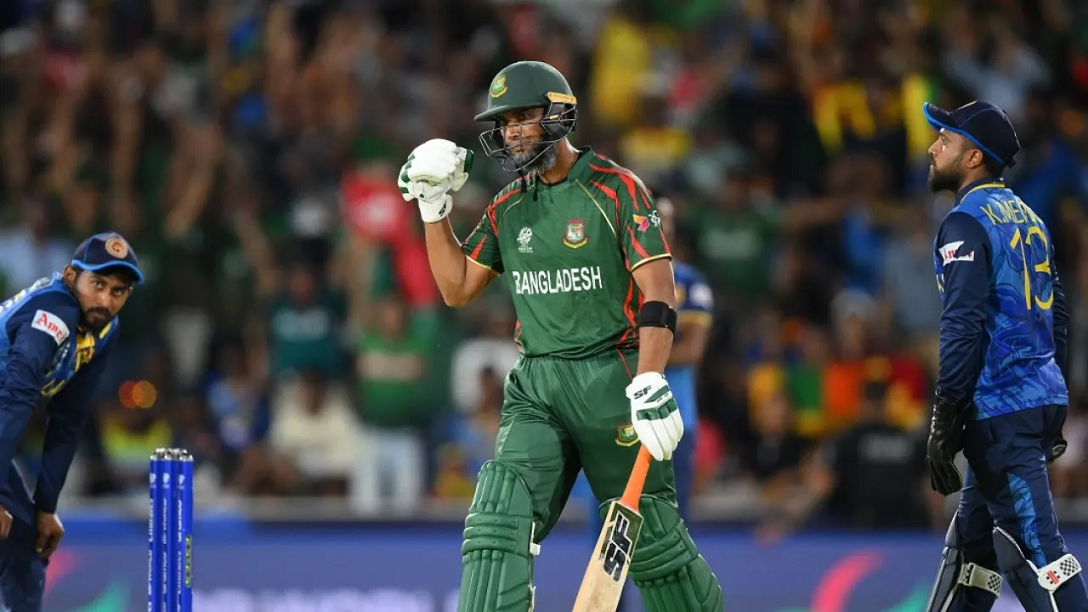
Nuwan Thushara’s last over brought Sri Lanka screaming back into the match,as he first bowled Rishad Hossain, and then nailed Taskin Ahmed in front of the stumps with a pinpoint swinging yorker. This left Bangladesh eight wickets down, with 12 runs still to get.
However, the experienced Mahmudullah was at the crease for Bangladesh, and despite some further nervy moments, pushed Bangladesh across the line off the last ball of the 19th over.
But this was a match chiefly decided by Bangladesh’s own outstanding bowling. Mustafizur Rahman was the best among them, using shorter lengths and his cutters efficiently, to claim figures of 3 for 17. Rishad Hossain’s three-for through the middle overs also kept Sri Lanka quiet.
Mustafizur was instrumental in Sri Lanka’s downward spiral through the middle overs, which culminated in a crash-and-burn end. Ultimately, their inability to find boundaries, or even rotate strike against good Bangladesh bowling resulted in their downfall. A score of 125 for 9 always seemed poor on a decent pitch, even if their bowlers made a match of it in the end.
Brief scores:
Bangladesh 125 for 8 in 19 overs (Towhid Hridoy 40, Litton Das 36; Dhanajaya de Silva 1-11, Nuwan Thushara 4-18, Wanidu Hasaranga 2-32, Matheesha Pathirana 1-27) beat Sri Lanka124 for 9 in 20 overs (Pathum Nissanka 47, Dhananjaya de Silva 21; Tanzim Hasan Sakib 1-24, Taskin Ahmed 2-25, Mustafizur Rahman 3-17, Rishad Hossain 3-22) by two wickets
[Cricinfo]
Latest News
Rashid, Farooqi and Gurbaz the stars as Afghanistan crush New Zealand

Afghanistan boosted their Super Eight chances with yet another dominating win, this time thumping New Zealand by 84 runs in Providence. Having beaten Uganda by 125 runs in their opening match, they are now at the top of Group C with a net run rate of 5.225.
After being sent in, Rahmanullah Gurbaz and Ibrahim Zadran gave Afghanistan a start of 103 in 14.3 overs. It came off the back of the 154 the pair added against Uganda, thus making them the first opening pair to register two successive century stands in the history of the T20 World Cup.
Afghanistan’s was an innings of two halves. They scored 55 for no loss in the first ten overs and 104 for 6 in the last ten, with Gurbaz contributing 80 off 56 balls. New Zealand, who had decided not to play any warm-up games, looked every bit rusty as their fielders dropped catches and missed run-out opportunities.
With the pitch assisting both seamers and spinners, chasing 160 was not going to be easy. But few would have expected New Zealand to collapse in the manner they did.
Fazalhaq Farooqi picked up three wickets in the powerplay and Rashid Khan three just after it. Eventually, both ended with identical figures of 4 for 17 as New Zealand were bowled out for 75 in the 15.2 overs. Glenn Phillips and Matt Henry were the only New Zealand batters to reach the double digits.
Trent Boult found some swing in the opening over but Gurbaz and Ibrahim showed their intent by picking up three fours off Henry from the other end. Both batters had luck on their side, too. Gurbaz got a second life when he skipped down the track to Santner and missed the ball, which went on to brush the leg stump but the bails did not budge. In the following over, Finn Allen dropped Ibrahim off Henry at the deep-square-leg boundary.
That was not all. Gurbaz got another reprieve after being involved in a miscommunication with Ibrahim. Having taken off for a single, Gurbaz had to retrace his steps and would have been run out had Conway not fumbled the throw.
Two balls later, New Zealand finally seemed to have found success when Santner pinged Ibrahim’s pads and umpire Kumar Dharmasena ruled it lbw. But the batter got the decision overturned on review as the ball was heading down the leg side. Immediately after that, Ibrahim hit Santner for an inside-out four as Afghanistan ended the powerplay on 44 for no loss.
New Zealand went against the prevailing wisdom of not bowling an offspinner when two right-hand batters at the crease, and Michael Bracewell repaid that faith by conceding only six off his first two overs.
Lockie Ferguson was even more frugal, going for five in his first two. He could have had Ibrahim off a slower full toss but a leaping Kane Williamson failed to pull off a one-handed stunner at mid-off. That meant while Afghanistan remained unscathed, they had only 55 on the board after ten overs.
Afghanistan had not hit a single six in the first ten overs, but there were five in the next three, including three in one Bracewell over as Gurbaz and Bracewell stepped on the accelerator. The pair took the side past 100 in the 14th over. New Zealand finally broke through when Ibrahim bottom-edged a short ball from Henry onto his stumps, after having been hit on the grille on the previous delivery.
Promoted to No. 3, Azmatullah Omarzai played his part with 22 off 13, which included two sixes in three balls off Henry. Mohammad Nabi fell for a first-ball duck but Gurbaz kept finding the boundary at regular intervals. However, a three-wicket, three-run final over by Boult kept Afghanistan to 159.
Farooqi gave Afghanistan a dream start with the ball. With the very first delivery of the innings, he uprooted Finn Allen’s leg stump as the ball moved in late. In the seamer’s next over, Conway pushed at one that seemed to come slower off the surface and was caught at extra cover.
The decision to give Farooqi a third over in the powerplay brought further rewards. This time, bowling around the wicket to Daryl Mitchell, he got a length delivery to just straighten and take the outside edge. Gurbaz took a regulation catch to complete the dismissal and leave New Zealand 28 for 3.
It could have been worse for New Zealand. In between, Naveen-ul-Haq had rapped Kane Williamson’s front pad after the batter had moved across to play a delivery. Afghanistan sent it upstairs for an lbw review but the umpire’s call saved the New Zealand captain.
Afghanistan did not have to wait too long for Williamson’s wicket. Rashid brought himself on after the powerplay and struck straightaway as Williamson guided one to first slip. But Rashid was just warming up. In his next over, he dismissed Mark Chapman and Bracewell off successive deliveries to leave New Zealand on 43 for 6. Chapman went for a pull and got bowled; Bracewell was late to bring his bat down and was lbw.
Phillips was New Zealand’s last hope. He did hit a couple of boundaries but was soon caught at long-on when he tried to take on Nabi. That ended any hopes of revival New Zealand might have had.
Brief scores:
Afghanistan 159 for 6 in 20 overs (Rahmanullah Gurbaz 80, Ibrahim Zadran 44, Azmatullah Omarzai 22; Trent Boult 2-22, Matt Henry 2-37, Lockie Fergusoan 1-28) beat New Zealand 75 in 15.2 overs (Glenn Phillips 18; Rashid Khan 4 for 17, Fazalhaq Farooqi 4 for 17, Mohammad Nabi 2-16) by 84 runs
[Cricinfo]


